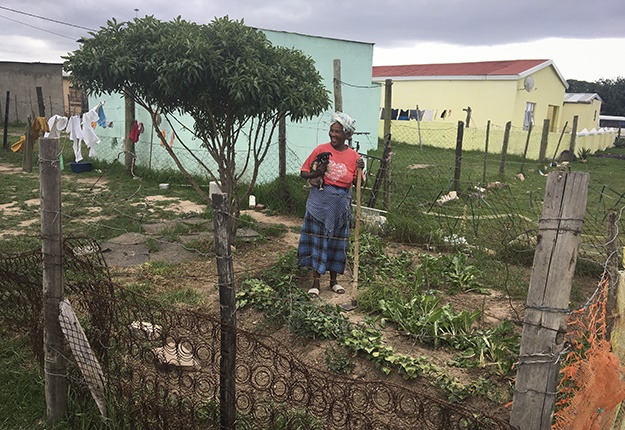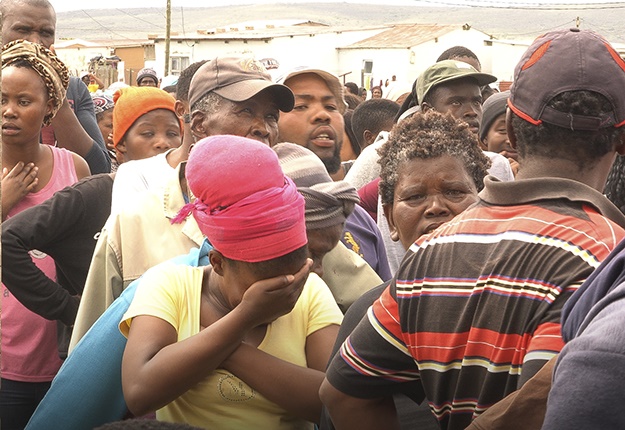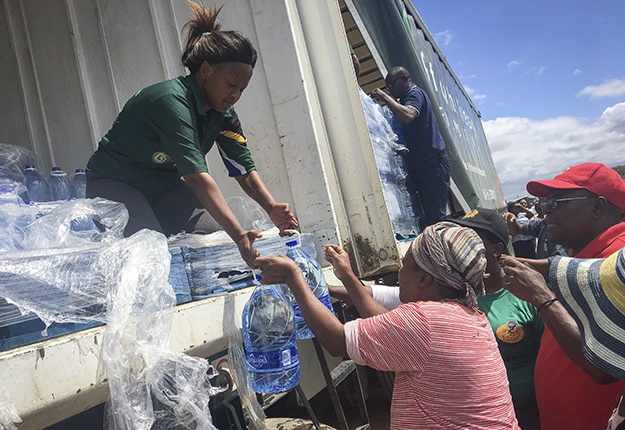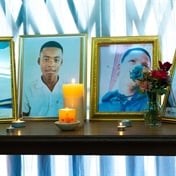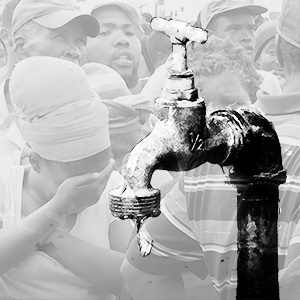
Mary Mkalipi knows hardship. She has gone to bed without food, and has "ironed" her children's school uniforms under a mattress because she didn't have money for electricity.
"But I have never felt faint of thirst, walked around with an unwashed body or sat in a stinking house because my toilet can't flush," the single mother of two from Joza, Makhanda (formerly Grahamstown), told News24.
"I have always taught my children, 'You can be poor, but you don't have to be dirty.' But look at us now."
For more than a week, Mkalipi had been without running water. She was one of hundreds of people who stood in endless queues for two five-litre bottles of water from humanitarian organisation Gift of the Givers.
The NGO travelled to the largest town in the Makana Local Municipality in February to bring relief to the parched locals who said they couldn't afford to buy water when they were already struggling to survive.
Supply to the eastern side of Makhanda in the Eastern Cape, came to a standstill after water supplied from the Fish River scheme to the Glen Melville Dam, whose water level had been low, resulted in the sediment being agitated.
At the James Kleynhans water treatment works, this sludged up operations.
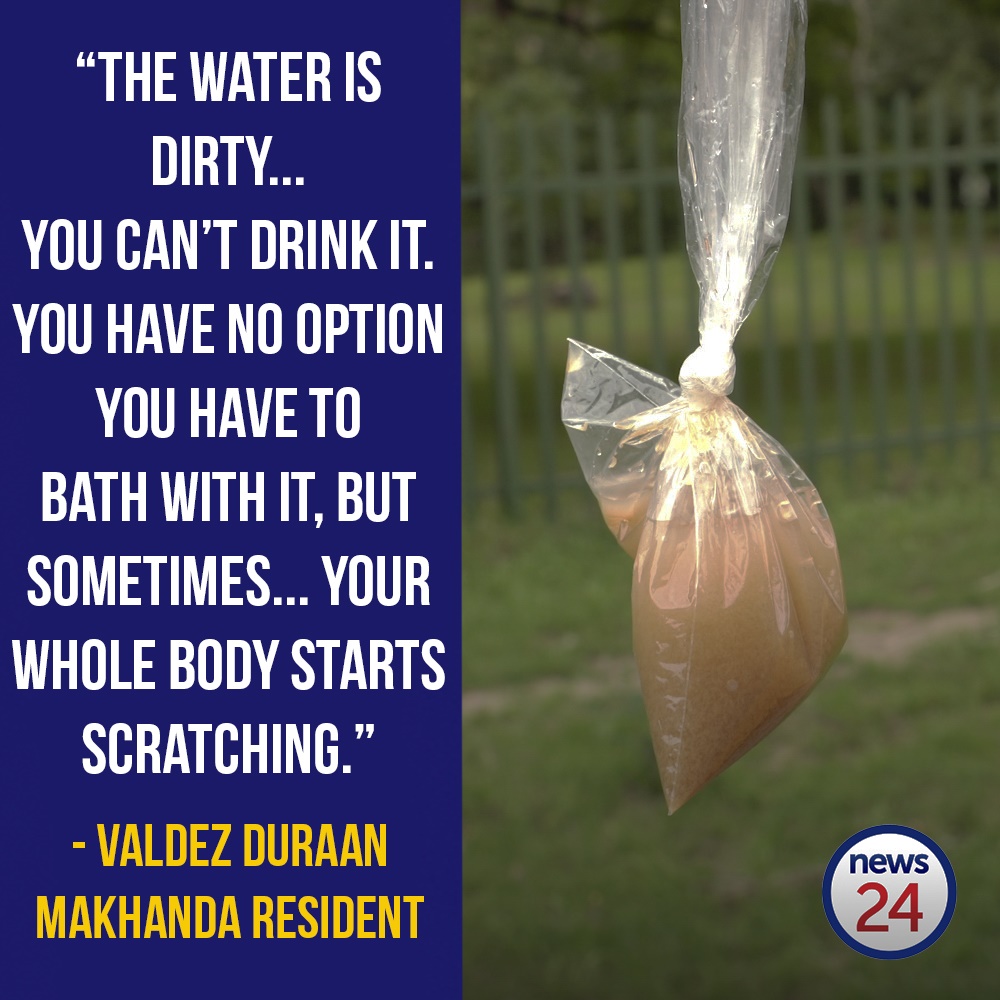
Pravesh Nosib, director at MBB Consulting Engineers, which has been contracted to ensure the stability and efficiency of the Makana water supply infrastructure, explained that the local James Kleynhans water treatment works became sludged up as a result of excessive silt.
"The plant is able to treat water which is about 80 NTU (nephelometric turbidity units). The water (at the time) was about 1000 NTU, which means the turbidity and the sediment was very high," he said.
All pumps at the plant were stopped and the reservoir couldn't be filled.
Staff started cleaning the water clarifiers and photos taken at the time showed an extreme amount of sludge, which Nosib said needed to be removed so that the sediment in the water could settle down.
Treatment of the water resumed eight days later and water started trickling through the taps again.
'It's not clean. I will get sick'
A disgusted Jane Skaka, 77, ran buckets of water from her outside tap, hoping the discoloured, "dirty" liquid would eventually run clear.
Even under normal circumstances, she doesn't drink the water without boiling it first.
"It's not clean. I will get sick," she insisted.
Only her little nameless puppy drinks the water straight from the tap, Skaka said. She is surprised the dog hasn't gotten sick yet.
The soil in her tiny garden, surrounded by a fence made with the metal springs of a stripped mattress, is bone dry.
Skaka hadn't watered her garden since the water cut.
She hit the earth with a hoe, resulting in a spray of dust and sand over the butternut and spinach she grows in neat rows.
The eastern half of the town's water woes had taken just under two weeks to resolve – with the James Kleynhans water treatment plant at full capacity again.
However, the water outage had caused a delay in the municipality's rush against the clock to avert Day Zero in the opposite end of town.
'The problem is treating the water'
Settlers Dam, which supplies water to the western side of Makhanda stood at 12.1% full on Monday.
"That dam, we're anticipating, is going to run out of water in about 20 to 30 days' time," Dr Iain L'Ange, the executive director of infrastructure, operations and finance at Rhodes University said in February.
"That means there is no more water from this supply source to this side of town."
The water in the eastern side of town ultimately comes from the currently full Gariep Dam up north, he explained.
Settlers Dam is completely reliant on rain water.
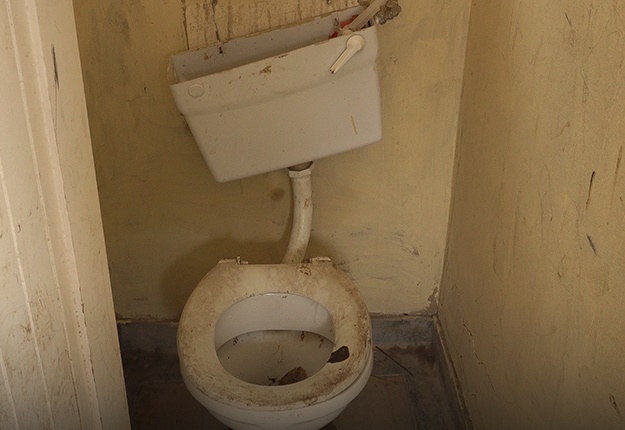
Toilets at several schools became unusable after water supplies were cut, forcing them to send pupils home. Picture: News24
L'Ange is part of a team of experts who have been working on a plan to save one end of Makhanda from disaster: getting the James Kleynhans water treatment plant to produce 10 megalitres of clean water per day to supply both the west and the east.
"We're not like other towns where the supply is going to run out. We might have a Day Zero for Settlers Dam, but we have a lot of water available. The problem is treating it."
The plant is currently producing in the region of six megalitres per day, although it has the capacity to produce 10 megalitres.
R30m is being pumped into the James Kleynhans project to ensure that the facility is able to operate optimally to produce the 10 megalitres by the end of March, Makana Mayor Mzukisi Mpahlwa told News24.
On Monday, he said plans were on track.
"Phase two will be upgrading the facility to double this, so that it is able to produce 20 megalitres of water (the town's current demand) by 2020."
About R140m will be used to expand the treatment plant over two years.
Nosipho Ndyogolo, 60, from Extension One says she prays that one day she will be able to open her tap and drink what comes out of it.
"But I can't. I try and buy the bottled water, but it's so expensive. It makes me so upset that I have to worry about something as basic as this. Doesn't the Constitution say we have the right to clean drinking water? Why is it okay that we must be happy with water that looks like what lies in the bottom of a dirty toilet bowl?"
L'Ange said there was indeed a legacy of poor maintenance of the water treatment plant, "but that's in the past".
"What needs to be done here is to ensure that the pumps are in good working order, that the filter beds are now cleaned out completely and ready to process this raw water efficiently and effectively."
No money
Mayor Mpahlwa admitted that water from the eastern part of town was different in colour and taste to that in the west. This was only because it emanated from two different river systems, he insisted.
"But in terms of its [drinkability], we have scientists who have told us there is absolutely nothing wrong with the water. The assurance we are getting from experts and quality assurance institutions is that the water will not lead to diseases and diarrhoea."
He insists he drinks the water from the tap in his home in the east. "I don’t stay on the affluent side," Mpahlwa told News24.
He has been Makana's first citizen for less than two months after being elected following the removal of Nomhle Gaga by the ANC in December.
He was also the first democratically elected mayor, occupying City Hall in 1995 before taking up a position in provincial government, he said. Mpahlwa jokes that he was taken out of retirement to lead the municipality again.
His city's problems run deeper than only water, potholed roads and badly littered streets, Mpahlwa admitted.
"It's caused by the fact that there is no money to fix it."
Money owed
Makana municipality owes its creditors R162m.
"But we are also owed. The businesses owe us R39m, residents owe us R393m and the government departments owe us R12m. So in total we are owed R450m," Mpahlwa said.
"Now if we were able to get all the money we are owed, we would be able to pay our creditors and still have R288m to fix our problems."
This financial state means it spends less than 5% of its budget on maintenance.
But he has a plan.
"We are trying to increase our revenue collection. We are now sitting on 76%, which is way below what is normal. If you are a city running properly, you must have a 95% collection rate," he said.
New revenue collection mechanisms have been adopted and a new CFO was appointed in December.
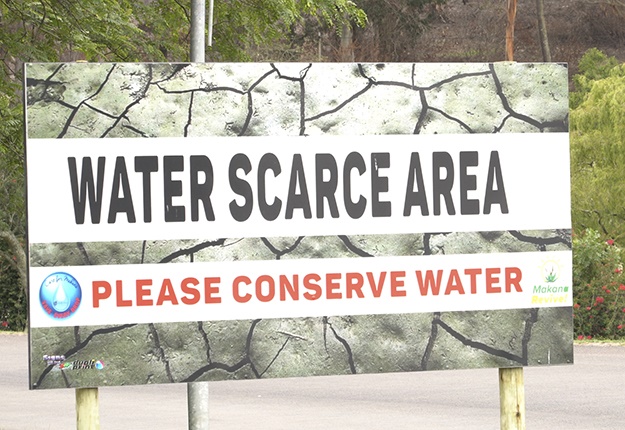
"With a new team there is possibility, and fresh ideas to fix things. But we need time – something we unfortunately just don’t have."
Makana Municipality applied to the Department of Water and Sanitation's drought relief fund, from which it received R22m.
R12m will be used to extract water from boreholes within the city and to develop a water treatment facility to treat it owing to a high iron content.
The rest of the funds will be used to fix leaks within the system so that the municipality is able to conserve the water it has, as well as for water demand management.
In addition to aged infrastructure which it can't afford to replace, it also has personnel capacity challenges, Mpahlwa said.
The municipality is operating without a director of infrastructure services as he has been suspended owing to "supply chain management issues", the mayor said.
"We are very thin on the ground, technically. We do have quite a lot of staff in the department, but they are mainly general workers, not technical people. They aren't plumbers who can fix the problems."
Meanwhile, the Sarah Baartman District Municipality in the Eastern Cape, which includes Makhanda, has since been declared a local state of disaster.
The declaration was made in terms of the Disaster Management Act 57 of 2002 and it was published in the Government Gazette of February 25.
On Friday, Gift of the Givers' Imtiaz Sooliman said reduced dam levels on the west and damaged filters on the east led to a shortfall of 13 megalitres (1 million litres) of water per day.
Last month, the organisation started drilling boreholes as a medium-term solution to the water crisis.
Sooliman on Monday said the "rescue plan" included drilling a minimum of 20 boreholes to provide several million litres of water per day.




 Publications
Publications
 Partners
Partners




